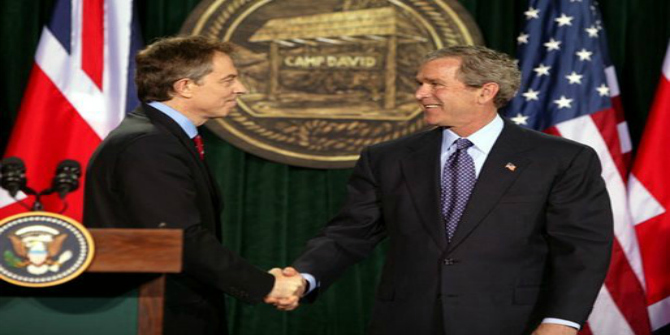 In Think Tank: The Story of the Adam Smith Institute, Madsen Pirie documents the fascinating history of one of the world’s biggest think tanks, and the many projects in which it has been engaged over the past three decades. Donald Abelson values the wealth of information with which scholars can develop and refine their observations about how think tanks exercise influence.
In Think Tank: The Story of the Adam Smith Institute, Madsen Pirie documents the fascinating history of one of the world’s biggest think tanks, and the many projects in which it has been engaged over the past three decades. Donald Abelson values the wealth of information with which scholars can develop and refine their observations about how think tanks exercise influence.
 Think Tank: The Story of the Adam Smith Institute. Madsen Pirie. Biteback Publishing. February 2012. 244 pages.
Think Tank: The Story of the Adam Smith Institute. Madsen Pirie. Biteback Publishing. February 2012. 244 pages.
In recent years, there has been growing scholarly interest in the rise of think tanks, and in their ongoing efforts to immerse themselves in the policy-making process. Much of this interest has been fuelled by journalists and pundits who have concluded, rightly or wrongly, that think tanks in the United States, the United Kingdom, and in other advanced industrialized countries frequently shape the policy preferences and goals of decision-makers. This perception has been reinforced by directors of think tanks on both sides of the Atlantic who have praised their institutes for leaving an indelible mark on major pieces of legislation.
And who could blame them? In what has become a highly competitive market in which think tanks and other non-governmental organizations struggle to attract the attention of policy-makers, the media, and potential donors, think tank directors have an incentive to showcase what their institutes have accomplished. Indeed, regardless of the actual impact these organizations have had on shaping public policy, directors go to great lengths to foster the illusion of policy influence.
As co-founder of the Adam Smith Institute (ASI), Madsen Pirie hardly needs to be convinced of the important role think tanks can play in generating and disseminating ideas, nor does he have to be reminded of how important it is for think tanks to market their research findings. For 35 years, Pirie, along with co-director Eamonn Butler, and a small but enthusiastic staff, has carved out a niche for the think tank that they established to honor the legacy and advance the ideas of the eighteenth-century Scottish social philosopher universally regarded as the father of modern economics.
Pirie’s reflections on the evolution of the ASI constitute far more than a chronicle of how one particular think tank has been able to navigate its way through Britain’s increasingly crowded marketplace of ideas. His thoughtful treatise is a commentary about the power of ideas, and the critically important contributions public policy research organizations can make in shaping the political discourse around a wide range of domestic and foreign policy issues. Established in 1977 to promote market solutions to policy problems, the ASI, as Pirie recounts, has been at the centre of several important debates that have preoccupied British parliamentarians for years. On issues ranging from reforming the National Health Service to making British Rail more efficient, Pirie makes a compelling case that the many studies and reports the ASI has generated, and the countless workshops, conferences, and power lunches it has organized, have indeed helped to inform several important policy debates. As a result, the ASI has been able to significantly raise its public profile and become a regular and active participant in high-level policy discussions.
In his carefully crafted narrative, which at times more closely resembles a how-to guide for think tanks, Pirie reveals, in ways only a think tank insider could, how he and Butler have been able to cultivate strong and important ties to the media, to leaders in industry and commerce, and to key officials in the governments of Margaret Thatcher and John Major. However, as important as it is to gain access to the country’s powerbrokers, Pirie frequently reminds his readers that for think tanks to achieve policy influence, they must present the right ideas, to the right people, at the right time.
Not intended to be an academic tome, Pirie’s book does not make a significant contribution to the emerging literature on assessing the impact of think tanks on public opinion and public policy. In fact, while the author points to several ASI studies that he believes influenced the direction of various policy debates, scholars studying think tanks would have to uncover considerably more empirical evidence to confirm Pirie’s conclusions.
Instead, the book is a valuable, candid insiders’ account of how one of Britain’s more established think tanks has transformed a set of unifying principles into a series of concrete policy proposals. By documenting the ASI’s history, Pirie has provided a wealth of information on which scholars can develop and refine their observations about the various conditions under which think tanks can exercise influence. His study also helps lay the foundation for future studies comparing the experiences of the ASI to the Washington, DC-based Cato Institute, another libertarian think tank established in the same year ASI opened its doors.
Readers need not be disciples of Adam Smith or free market solutions to a host of domestic policy problems to appreciate Madsen Pirie’s insights about the role of think tanks in British politics. They simply have to be interested in how ideas that shape the political agenda of the nation affect their daily lives.
Memoirs from former politicians and CEOs of Fortune 500 companies regularly appear in neighbourhood bookstores and libraries, but it is rare to stumble across a study that documents the internal workings of high-profile think tanks. In part, this is because directors of think tanks, recognizing the competitive nature of the think tank world, have been reluctant to share information that could compromise their competitive edge. Fortunately, like the man who inspired the creation of the ASI, Pirie appreciates that the health and wealth of a nation is achieved not only by encouraging competition over the provision of goods and services, but by embracing the free and unfettered exchange of ideas.
——————————————————————————————-
Donald Abelson is Professor, Political Science, Director, Centre for American Studies, and Director, The Canada-US Institute at The University of Western Ontario in London, Canada. He is the author of several books including: Do Think Tanks Matter? Assessing the Impact of Public Policy Institutes (Second Edition, 2009), which has been translated into Simplified Chinese and Arabic; A Capitol Idea: Think Tanks & US Foreign Policy (McGill-Queen’s University Press, 2006); and American Think Tanks and their Role in US Foreign Policy (Macmillan and St. Martin’s Press, 1996). His work has also appeared in over three dozen journals and edited collections. He is currently writing a book on the tensions that have either seriously compromised or severed the relationship between conservative American think tanks and the more liberal universities where they are or were housed.








If you want proof of Madsens influence then I would just mention – not the war – but the community charge. Alas it was not introduced as the small sum originally thought of, but as much larger amount, and consequently it failed.